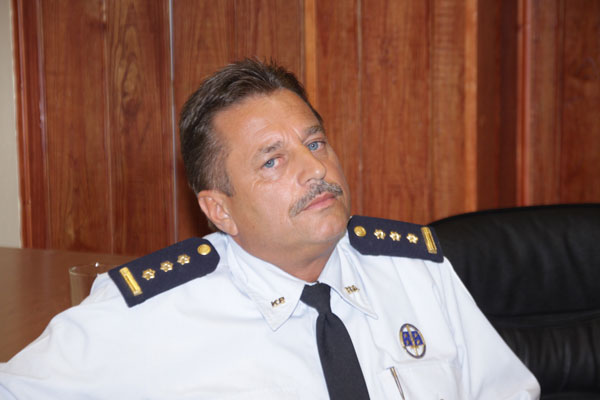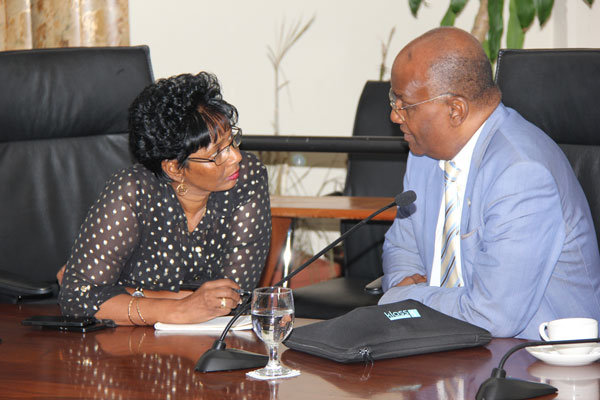 "I want to stand by my word, when I started to work on St. Maarten I promised to work for a few years then leave the chair for a local person."
"I want to stand by my word, when I started to work on St. Maarten I promised to work for a few years then leave the chair for a local person."
PHILIPSBURG:--- Chief Commissioner of Police Peter de Witte will soon leave the chair he is sitting on as Chief Commissioner of Police at KPSM. The Minister of Justice is expected to make the position available so that candidates on St. Maarten and other surrounding islands can apply for the post which will become available as of January 1st, 2015. The new Chief of Police will be installed as soon as one is found for St. Maarten, De Witte said.
A committee will be installed to interview the candidates that apply and they will also advise the Minister of Justice on who will be the best candidate to take over from De Witte.
In an exclusive interview with SMN News, De Witte said even though he has a contract that has no end date he agreed to work for St. Maarten for a certain amount of years then he would leave so that a local can become Chief Commissioner of Police. De Witte said he is on his fifth year as Chief of Police on St. Maarten, he was appointed in June 2010 by former Minister of Justice of the Netherlands Antilles Magali Jacoba.
The top cop said he believes that it is time for someone else to take up the position also he is a man of his word because even though his contract has no end date he gave his word to everyone prior to his appointment on St. Maarten. "There are people who would prefer to stay on that chair or even fight for the position but I believe that if KPSM is to develop and become stronger then someone else needs to take the helm and bring new ideas with goals that will develop the force," De Witte explained.
"I believe that a new person will bring fresh ideas and have new goals which will better enhance and strengthen KPSM. I have done my job as Chief Commissioner of Police now it's time for a new face at the helm of KPSM." Even though De Witte will be leaving his post as Chief Commissioner of Police he will remain with KPSM for a period of time as an advisor to the incoming Chief of Police to ensure a good transition. He further explained that whomever the new Chief of Police will be he stands ready to wear a new cap and to coach that person in order for them to move KPSM forward.
Peter de Witte started his career as a regular police officer in Rotterdam, he worked his way up the ladder until he became Commissioner of Police in Rotterdam where he held the portfolio to manage the relations between the Netherlands and the former Netherlands Antilles (Curacao, St. Maarten, Aruba and Suriname). De Witte held that post for some ten years. He then moved to Aruba in 2003 where he was appointed Deputy Director of the Coast Guard, in 2006 Peter de Witte was appointed Chief of Police of Aruba until June 2010 when he was selected to be the Chief Commissioner of Police on St. Maarten. In an invited the comment Minister of Justice Dennis Richardson said that he is not at all happy that De Witte has chosen to vacate his position. "In fact I am hoping that St. Maarten can maintain the services of Peter De Witte in another capacity within the Justice Ministry. However, I do believe that Chief Commissioner Peter de Witte has been generous with his decision to vacate the position and give those he helped train the possibility to lead the organization he helped build."
In an invited the comment Minister of Justice Dennis Richardson said that he is not at all happy that De Witte has chosen to vacate his position. "In fact I am hoping that St. Maarten can maintain the services of Peter De Witte in another capacity within the Justice Ministry. However, I do believe that Chief Commissioner Peter de Witte has been generous with his decision to vacate the position and give those he helped train the possibility to lead the organization he helped build."
When asked what positions are available for De Witte to take up on St. Maarten, Minister Richardson said that Peter de Witte is the one that has to decide whether or not he will return to the Netherlands since a lot of it has to do with the financial possibilities. "Mr. De Witte is in permanent services on St. Maarten so finding a post for him will not be a difficult task, we will need to place him in a position where he would assist the Ministry of Justice in achieving its goals. The question right now is if De Witte will stay on St. Maarten and those talks are now ongoing with De Witte."
When asked if he will consider Peter de Witte to head International Relations within the justice system since he has great experience in this area, Minister Richardson said that is one of the options on the table because St. Maarten has great interest in combatting international organized crimes. "This is something we cannot do alone, it has to be done in close cooperation with the French side and the neighboring islands and or countries, the United States of America and probably some other organizations. I personally believe that we have to develop a long term policy on how we will deal with international organized crimes and not deal with it in an adhoc manner."
Minister Richardson said he held talks with the Minister of Justice in the Dominican Republic, Aruba and Barbabos as they are working on having direct relations with these countries. In a conference held in Colombia it was decided that closer cooperation has to be between the Caribbean nations which St. Maarten suggested to lead but Barbados opted to take the challenge and we are now waiting on Barbados to kick off. "We have not seen anything done yet by Barbados since the talks began but I simply cannot wait because I do not want to see St. Maarten getting itself into a situation like Curacao, therefore I would like to be prepared, have the necessary information and to act when necessary.









